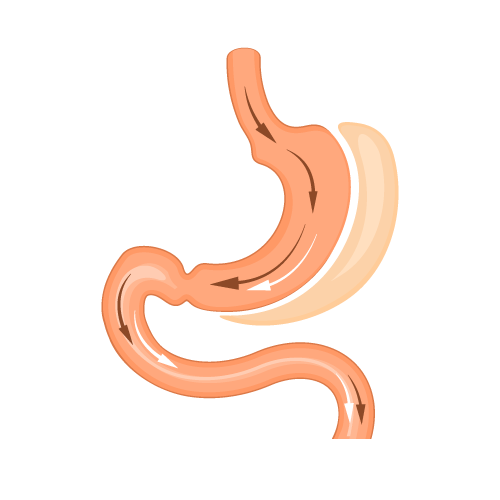Laparoscopic Sleeve Gastrectomy (LSG)
In overweight individuals, LSG is a treatment of choice. This is also broadly known as Bariatric surgery. The principle of this surgery is to make you feel fuller by eating less. This means the stomach size is reduced by removing the fuller part of the stomach known as the “fundus”. This is a surgery wherein almost 85% of the stomach is removed and reshaped into a tube or sleeve-like structure. Hence the name.
The surgery is performed after assessing the patient’s BMI (Body mass index) and overall health. Patients with class III obesity (BMI >40kg/m2) are ideal candidates for Sleeve Gastrectomy. Your health goals like weight loss, lifestyle management, diet, and nutrition are all planned, as these factors are crucial for treatment success.
The procedure
This surgery is done under general anesthesia and requires hospital admission for two days or as suggested by the surgeon. It is essential to manage your diet before the procedure too. The fundus, a curved part of the stomach, is removed and the rest of the stomach is closed, giving it a tube-like structure. This resembles the sleeve of a shirt, also known as sleeve gastrectomy. The procedure is approached with minimal access via incisions in the abdomen. With the help of a laparoscope, the surgeon can access and see the stomach. Almost two-thirds of the stomach is stapled shut, and one-third is left, creating a sleeve-like structure. The rest of the tube allows for the passage of food.
This kind of vertical reduction of the stomach leads to a restricted food intake. The benefits of this surgery are the feeling of fullness on eating less and reduced hunger. The fundus portion of the stomach secrets a hormone known as Ghrelin, which makes you feel hungry.


RISKS, RECOVERY, AND AFTERCARE
The risks are similar to any other surgical procedure, like bleeding from the site of incision and infection. The surgical implications can be stomach (gastric) juices leaking from the part removed, narrowing of the diameter of the stomach, and poor nutrient absorption.
LSG has lesser complications than other weight loss surgeries for those with heart, lung and liver problems. Most weight loss happens in the first two years of the LSG. There is also improvement in chronic diseases like diabetes, hypertension, and high cholesterol, amongst other benefits of the surgery. It also improves fertility in females with Polycystic Ovarian Disease (PCOD) or Polycystic Ovarian Syndrome (PCOS).
